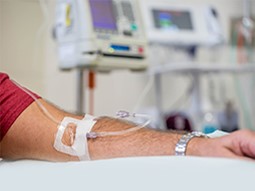What is cardiac anesthesia?

When you’re undergoing a major cardiac procedure, you can trust our dedicated team of cardiac anesthesia providers to deliver safe and effective anesthesia. We specialize in advanced monitoring techniques and medication that can improve your heart function and maintain your blood pressure as you undergo cardiac procedures.
Cardiac anesthesia is anesthesia used to put you to sleep and keep you safe and pain-free as you undergo surgery or a diagnostic procedure on the heart. While patients undergoing heart surgery or procedures will receive many of the same types of anesthetic medication as other types of surgery, our cardiac anesthesiologists also optimize your heart function while managing your heart rhythm and after surgery.
Cardiac surgeries and procedures are often more complex than general surgery due to deterioration of the heart caused by heart disease. MedStar Health’s cardiac anesthesiologists are specially trained to understand the changes in heart function and blood pressure that occur as a result of heart disease and complexities related to the heart. During surgery, our cardiac anesthesiologists manage your heart function using specialized monitoring techniques and a variety of anesthetic medication to keep you safe during your procedure.
Our cardiac anesthesia providers
Our anesthesiologists are highly trained in physiology of the heart and the effect of medications on your heart and other vital organs during heart surgery. Our providers use a team approach, as our anesthesiologists monitor and fine-tune medications to optimize the function of your heart while the surgeon focuses on your surgery.
When you receive anesthesia for a cardiac procedure at MedStar Health, you’ll benefit from our:
- Highly trained cardiac anesthesia specialists
- One-on-one focused attention
- Advanced monitoring techniques
What to expect?
Anesthesia for cardiac surgeries is different from general anesthesia because the procedures can affect the function of your heart. That’s why our care team thoroughly reviews your medical history and diagnostic tests before creating an anesthesia plan based on your needs. Then, your cardiac anesthesia providers will give you specialized instructions related to food, drink, and medication prior to your scheduled procedure.
When you arrive for your cardiac surgery or cardiac procedure, your anesthesiologist will meet with you and your surgeon in the preoperative area to discuss your anesthesia plan. We encourage you to ask questions so you feel calm and prepared going into your procedure.
If you are having heart surgery, you will be given a general anesthetic through your IV. Patients undergoing heart surgery require general anesthesia for a safe and comfortable procedure, as it ensures you are unconscious for the duration of the surgery. During general anesthesia, you are unaware of your surroundings during surgery, and you will feel no pain or other sensations.
If you are receiving a diagnostic or therapeutic cardiac procedure, you may only need IV sedation and a local anesthetic. You will be in “twilight sleep,” which means you may fall into a light sleep during the procedure. In this instance, you will not need a breathing tube and you won’t receive anesthesia gases that keep you in deep sleep.
Cardiac monitoring techniques for heart surgery
Your care team will wait until you are asleep before placing a breathing tube in your windpipe (trachea), which will help control your breathing and deliver anesthesia gases to keep you asleep during heart surgery. At this time, your cardiac anesthesiologist may also place a transesophageal echocardiogram (TEE) probe in your food pipe (esophagus), which will help to monitor your heart function and heart valves. For example, the TEE probe helps your anesthesiologist check the function of a new heart valve to ensure it is working properly before you are out of the operating room.
During the procedure, your anesthesiologist will remain by your side and will continuously monitor each of these advanced tools to optimize your treatment during anesthesia.
Recovery
After your procedure, you will be transferred to the Intensive Care Unit (ICU) to safely recover. Unlike other surgeries, you will be on a breathing machine, called a ventilator, for a period of time after surgery. Your care team will continue to deliver IV pain medication and sedatives, but you will not be in a deep sleep and may be aware of your loved ones when they visit you.
You will remain sedated while on the ventilator until the Intensivist confirms:
- There is no bleeding
- Blood pressure is stable
- Oxygen levels in your blood are satisfactory
When your ICU team decides it is safe, they will allow you to wake before removing the breathing tube.
After any major surgery, some pain is inevitable and completely normal. However, we work together to combine various medications that offer superior pain relief after surgery. As you wake, your care team will continue to monitor you and provide pain relief using a variety of techniques that also:
- Minimize nausea
- Improve recovery time
- Reduce the need for opioids
- Manage your heart and lung function
Questions to ask your anesthesia team
Our cardiac anesthesia providers will help you understand safe and effective methods for minimizing your pain, improving your heart function, and helping you recover quickly and safely. To ease your mind as you prepare for cardiac anesthesia, you may want to ask your anesthesia team the following questions:
- What medications should I continue taking or stop taking before surgery?
- How long will it take for the anesthesia to wear off?
- Will I need a blood transfusion during surgery?
- How will my pain be managed after surgery?
- When do I resume regular medications?
Our providers

Expert anesthesiology care
Getting the care you need starts with seeing one of our anesthesiologists.
Additional information
For patients
Our team is here to guide you, making sure you understand your anesthesia options every step of the way.
Learn more
Insurance
MedStar Health accepts most major health insurance plans. If you are uncertain as to whether your individual health insurance plan is accepted at MedStar Health, please call your insurance company.









